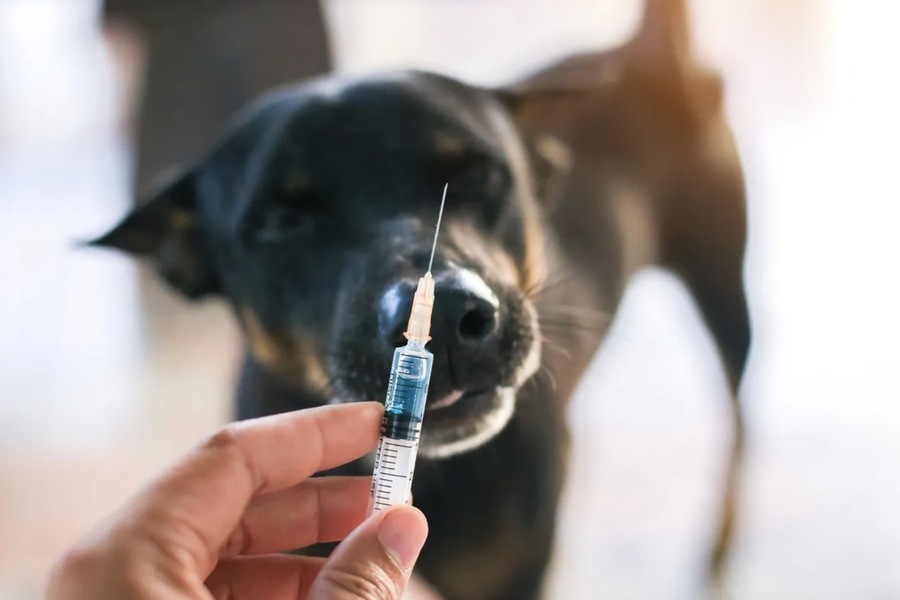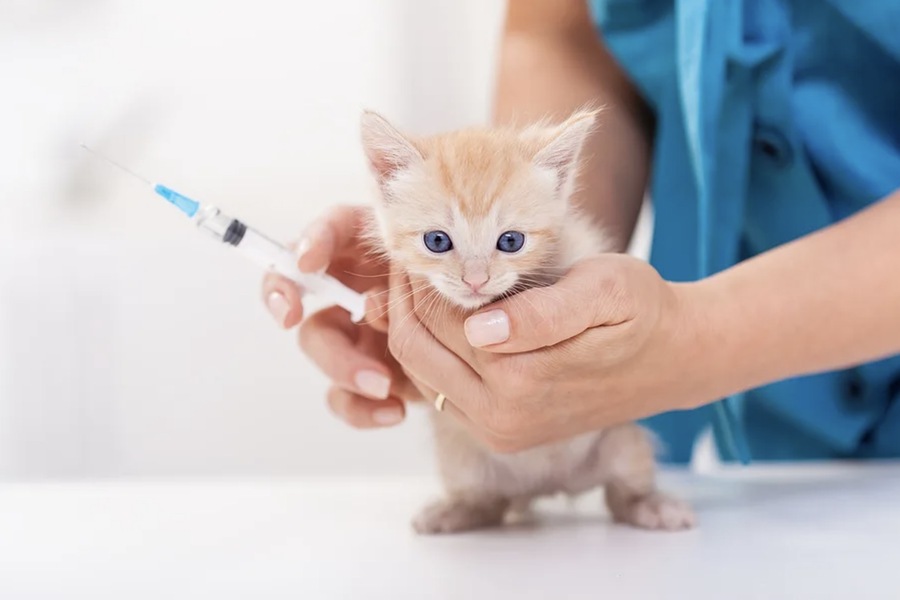Pet vaccinations play a critical role in upholding responsible pet ownership. They safeguard the well-being of pets and other animals and humans with whom they may come into contact. By immunizing pets against common and potentially life-threatening diseases, vaccinations establish a barrier against the spread of infections. For pet owners intending to board their pets at a facility or travel with them, a comprehensive understanding of vaccination requirements is imperative to facilitate a seamless process.
Why Is It Important to Get Vaccinated?
Vaccines protect animals against bacteria and viruses, among other dangerous organisms that can cause life-threatening illnesses. The presence of pets in communal settings, such as boarding facilities or pet daycares, raises the possibility of infectious disease transmission. Vaccinating your pet helps lower this risk and makes the environment safer for all animals. Furthermore, to guarantee the welfare of all animals, numerous pet-related services, such as boarding, creche, and travel, demand documentation of current immunizations.
Legal requirements for vaccinations frequently apply to pet travel abroad. Certain nations may implement stringent quarantine protocols to avert the introduction of diseases that can endanger the health of local fauna or people. Vaccinations ensure compliance with these regulations and can prevent lengthy or expensive quarantines.

Common Vaccines Required by Boarding and Daycare Facilities
For Dogs
Rabies: In many places, including the UAE, immunization against rabies is legally mandated and practically always necessary. Since rabies can be deadly to humans and animals, most facilities will need documentation of this vaccination.
The three main vaccinations that guard against common and serious canine diseases are DHPP (distemper, adenovirus, and parvovirus). As your veterinarian advises, booster shots must usually be given and current.
Kennedy Cough (Bordetella): A Bordetella vaccination is frequently required When dogs socialize, such as in boarding or creche situations. In social settings, the extremely contagious kennel cough can spread swiftly.
Leptospirosis – While not always a core vaccine, some facilities may require Leptospirosis vaccination, especially in areas prone to outbreaks.
For Cats
Rabies—Like dogs, cats must be vaccinated against rabies in most regions, especially if traveling internationally or at boarding facilities.
Feline Viral Rhinotracheitis, Calicivirus, and Panleukopenia (FVRCP) – These core vaccines protect cats from highly contagious and potentially deadly diseases. Boarding facilities typically require proof that these vaccinations are current.
The Feline Leukaemia Virus (FeLV) vaccine may be necessary for cats that interact with other animals since FeLV can be transmitted through intimate contact.
Common Rules for Boarding and Nursery Establishments
Strict vaccination regulations are in place at most boarding and daycare centers to guarantee the security of every animal in their charge. Pets are usually not allowed inside the institution unless they have had the required core vaccinations. Given the close quarters and increased risk of respiratory illnesses, many facilities now require non-core vaccinations, like the Bordetella vaccine for dogs.
Facilities may also request proof of a pet’s immunization history from owners; this evidence typically takes the form of a vaccination certificate from a veterinarian. Different facilities may impose additional restrictions, such as a waiting period between the date of immunizations and boarding, to ensure that the pet’s immune system is fully activated.
Pet Travel: Vaccinations for Infectious Diseases
Pet travel overseas is subject to strict regulations, and vaccination requirements differ significantly between countries. For example, most nations in the European Union require pets to have a valid certificate of rabies vaccination, which must be administered at least 21 days before the pet arrives. Some countries may also require additional vaccinations, such as those for tapeworm or leptospirosis.
Many airlines also follow International Air Transport Association (IATA) guidelines stipulating that pets must meet specific vaccination requirements before travel. Please comply to avoid denied boarding or quarantine upon arrival.
The UAE, for example, has stringent guidelines for pets entering or leaving the country. Pet owners looking for pet vaccinations in Dubai should check with local veterinarians and governmental websites like the Ministry of Climate Change and Environment to ensure all required vaccinations and certificates are in order before traveling.
Regional Variations in Vaccination Requirements
Different countries and even specific states or cities within countries may have varying vaccination requirements. In the UAE, rabies vaccinations are essential, but additional vaccines like those for leptospirosis may not be as commonly required as in other regions. It is important to consult with your vet or check with relevant authorities, such as the UAE Pet Travel Advisory, to ensure your pet is adequately vaccinated before boarding, daycare, or travel.
In countries like Australia and Japan, pets may be subject to lengthy quarantine if they do not meet the vaccination and health check requirements. Understanding these variations will prevent unexpected delays or added costs during travel.
Health Certificates and Documentation
Most countries require a health certificate signed by a licensed veterinarian for pet travel, especially internationally. This certificate typically includes details of your pet’s vaccinations, health status, and microchip information and needs to be issued within 10 days of travel.
Health certificates are also essential for boarding and daycare. While some facilities may not require a formal certificate, most will ask for vaccination records as proof of compliance. Always check with your chosen boarding or daycare facility beforehand to ensure you have the necessary documentation.
Consequence of Not Following Vaccination Requirements
Following immunization schedules may lead to boarding or nursery establishments refusing services. Significant travel difficulties may also result from airlines refusing to allow pets not meeting vaccination requirements to board. Above all, pets that have not received their vaccinations are susceptible to illnesses, some of which are deadly. For example, rabies can be prevented with the right vaccination, but it is invariably fatal once symptoms occur.

Information for Pet Owners Before Travelling
Pet owners can take the following actions to ensure that their animals are prepared for travel, boarding, or a nursery:
Consult a veterinarian for guidance
Make an appointment with your veterinarian to ensure your pet has received all necessary vaccinations and obtain any required certificates.
Check Specific Requirements
Each boarding facility, airline, or country may have different vaccination requirements. Research these well in advance to avoid any last-minute issues.
Obtain Proof of Vaccination
Keep copies of vaccination records and certificates readily available.
Give immunizations well in advance.
Before boarding or departure, make sure all vaccinations are given within the allotted time range.
Prepare a Booster Plan
To keep your pet’s immunity intact, schedule booster doses as needed.
Having a current pet vaccination record is crucial for UAE pet owners who want to use boarding and daycare facilities and vacation abroad. Keeping your pet safe and ensuring hassle-free encounters requires following the rules and immunization schedules.
In Summary
Vaccinations are critical to pet care, particularly for boarded pets, those attending daycare, or those traveling. Following vaccination schedules and staying informed of requirements, pet owners can protect their pets and ensure their safety in various environments.

